This annual report for 2024/2025 marks the end of a five-year strategy period. In that time, we have continued to deliver meaningful impact through both planned programmes of activity and agile responses to emerging societal need. In the last year, we have made some of the most significant contributions to our twin goals for the 2020 to 2025 strategy period: a sustainable society and an inclusive economy.
Building a sustainable society and inclusive economy
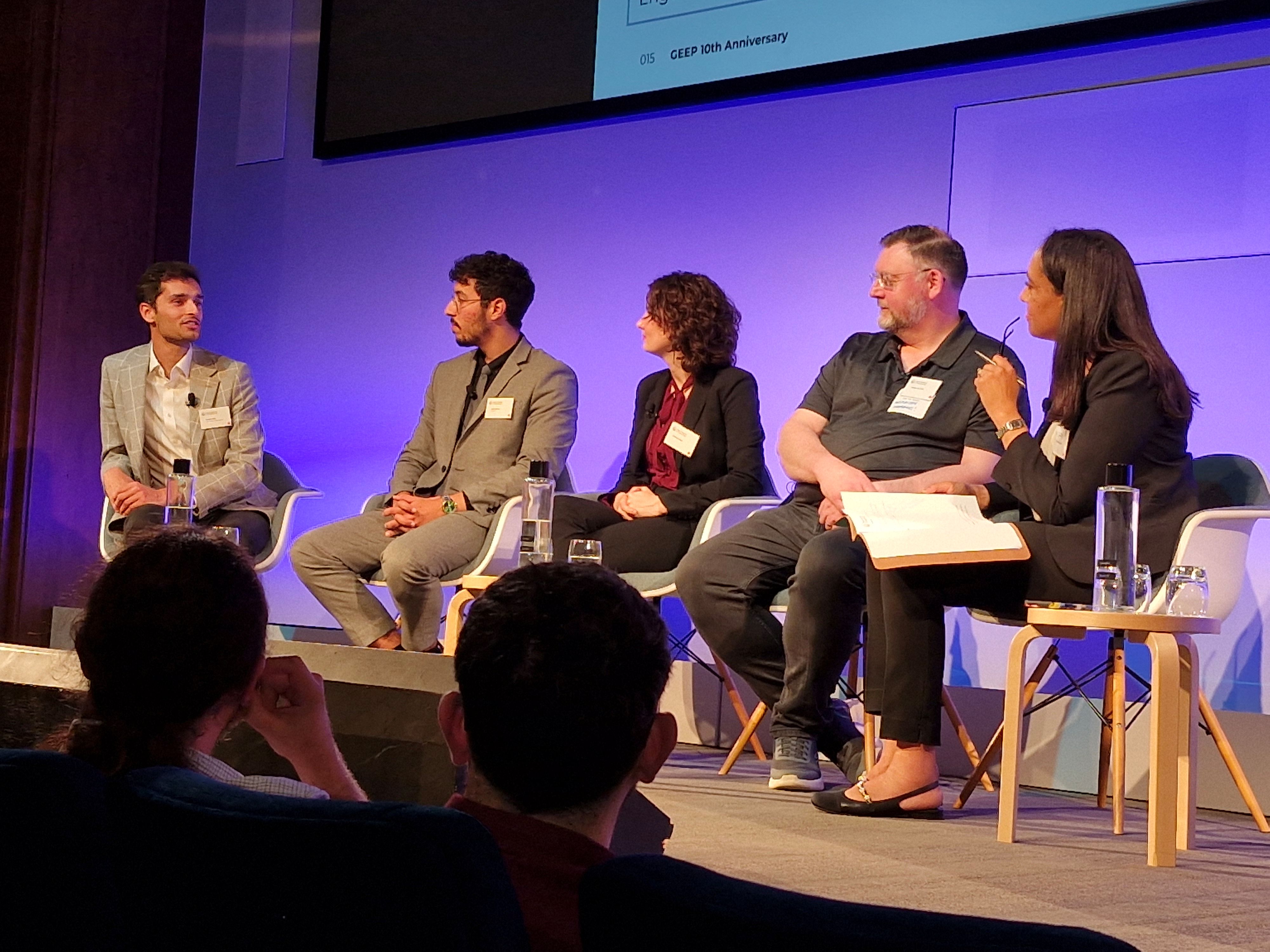
Speaker panel at the Graduate Engineering Engagement Programme 10th anniversary event
Talent and Diversity
In the face of complex, evolving and interconnected global challenges, we need more engineers and technicians than ever, with a wider range of skills and perspectives.
It is important this workforce is fit for the future – reflecting society in its diversity and committed to creating inclusive cultures that enable excellence – and has the skills to meet future needs safely, securely and ethically, while keeping pace with innovation.
One of our key goals over the past five years has been helping to build this workforce – both in the UK and internationally – and ensuring that it is supported in its ongoing development.
This is Engineering: Schools programme
Our new This is Engineering: Schools programme supports STEM education across Scotland, Northern Ireland, Wales and the West Midlands in both rural and inter-city areas of high socio-economic deprivation.
Closely aligned with the This is Engineering campaign, the schools programme builds on the learnings and best practice from our previous education programmes and aims to change learners’ perceptions of engineering, inspire their participation in STEM subjects, and boost teacher knowledge and confidence – while reflecting the regional context of all the areas we work in. It also focuses on increasing participation from students who are women and from other groups underrepresented in engineering.
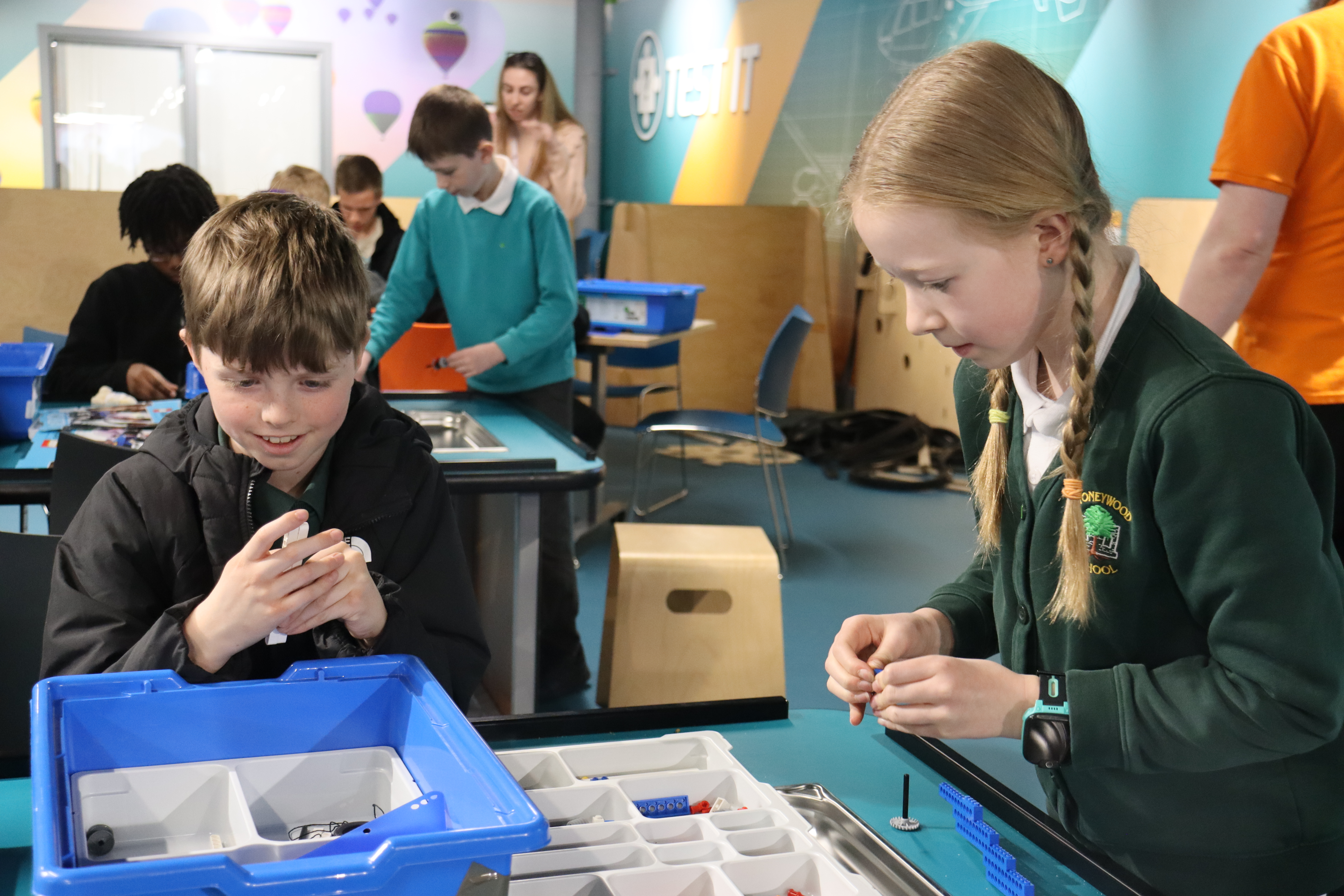
Attendees try out the activities on offer at Aberdeen Science Centre at the launch of This is Engineering: Schools – Scotland.
This is Engineering: Schools – Welsh Valleys
Formerly the Welsh Valleys Engineering Programme, this scheme secured significant funding from partners the Welsh Government Tech Valley programme and the Panasonic Trust this year. The result was an additional 20 primary and secondary schools in Caerphilly joined the project. Since 2018 the programme has:
- Engaged 4,650 pupils across primary, secondary and special educational needs schools.
- Had more than 15,000 school pupils and 3,000 college students participating since 2018.
- Delivered an employer engagement strand, with the support of seventeen businesses between 2021 and 2024, developing STEM challenge projects with teachers that focused on building careers awareness and employability skills.
In March, we launched the Scotland strand of the project with primary and secondary schools in Aberdeen City and Aberdeenshire, supported by Boeing, the Royal Air Force, SGN,Venterra, and the estate of the late Mr John Gozzard. A launch event at Aberdeen Science Centre allowed students aged between 9 and 14 to enjoy hands-on engineering activities and hear from some of today’s young engineers about why they chose engineering as a career. Teachers and students also met local representatives from engineering businesses and local employers who shared insights into what it takes to be an engineer and the wide range of job and career opportunities engineering offers.
MSc Motorsport Scholarships Programme
We also awarded grants to our second cohort of students participating in the MSc Motorsport Scholarships Programme,run in partnership with Sir Lewis Hamilton HonFREng’s charitable foundation Mission 44.
The three women and five men in the cohort joined the programme at a special event in November at the Formula 1® Exhibition at Excel London, hosted by Ariana Bravo, Formula 1 presenter for Channel 4 and F1 TV. The latest scholars had a Q&A session with engineers from Formula 1® and the Mercedes-AMG PETRONAS F1 team. They also met some of the scholars from the first year of the programme who have graduated and successfully secured jobs in F1 and the wider sector and will also act as mentors, to further strengthen the community of emerging motorsports professionals.
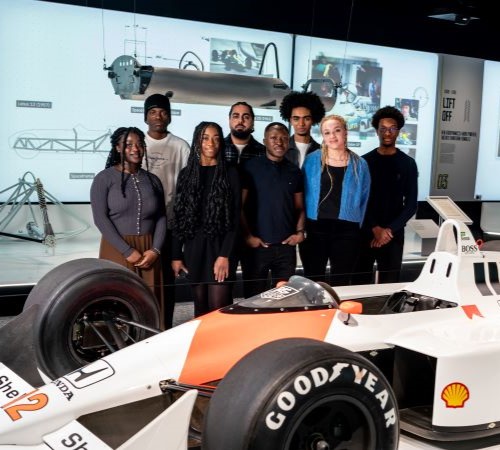
Our second cohort of MSc Motorsport Scholars at the Formula 1® Exhibition at Excel London in November.
This year, two of our programmes that aim to enhance the learning, teaching and skills of engineering students came together to develop a unique peer-to-peer mentoring network.

Members of the mentoring network at the 2024 ELS annual conference.
Engineering Leaders Scholarship (ELS) programme
Our Engineering Leaders Scholarship (ELS) programme supports ambitious undergraduates in UK higher education institutions who display the potential to become leaders and innovators in engineering. Meanwhile, the Visiting Professors scheme allows industrial engineers and entrepreneurs to participate in university teaching. With support from Visiting Professor Dr Emma Taylor and external peer mentors from across industry and academia, ELS awardees have developed their own peer-to-peer mentoring community to support one another in accelerating career impact.
Mentoring for personal development
A dedicated mentoring group has created and managed the network over the past 12 months in response to an ELS-led proposal at the 2023 annual conference. The network aims to bridge age and knowledge gaps and help break down barriers to opportunity. The core activity for this first year of peer-to-peer mentoring has been supporting one another with developing personal development plans, in line with the ELS programme’s aim of awardees moving into engineering leadership roles early in their careers.
Impact projects
One impact project already delivered was a Google-hosted hackathon as part of the Engineers for Deaf Awareness Project (E-DAP), an initiative established by Dr Taylor that focuses on making deaf awareness standard practice in engineering. ELS scholars visited Google’s Accessibility Discovery Centre for a tour of the technology at the centre, before taking part in the hackathon. This was aimed at developing integrated technology support for deaf individuals in professional and academic settings. The team heard a keynote talk and benefited from valuable advice provided by the RNID (the Royal National Institute for Deaf People), a Google Accessibility Discovery Centre partner. Members of the group have also joined career workshops and delivered a workshop at the Awardee Excellence Community conference.
Graduate Engineering Engagement Programme 10th anniversary
students
universities
women
from Black, Asian and minority ethnic
In 2024, the Graduate Engineering Engagement Programme (GEEP) celebrated 10 years. Run in partnership with engineering employers including Amey, Rolls-Royce, bp, Johnson Matthey, National Grid, COWI and BAM, GEEP aims to increase the numbers of engineering graduates from diverse backgrounds entering the profession and has worked with over 300 volunteers from more than 50 companies. In the 10 years that it has been running, more than 1,300 students from over 70 universities have taken part,30% of whom were women and over 90% from Black, Asian and minority ethnic backgrounds. The programme has led to at least 320 engineering employment opportunities including internships, graduate placements and jobs. In recent years, we have delivered the programme in partnership with the Windsor Fellowship and with support from the Association for Black and Minority Ethnic Engineers and the Women’s Engineering Society.
First cohort of Inclusive Leadership Programme awardees
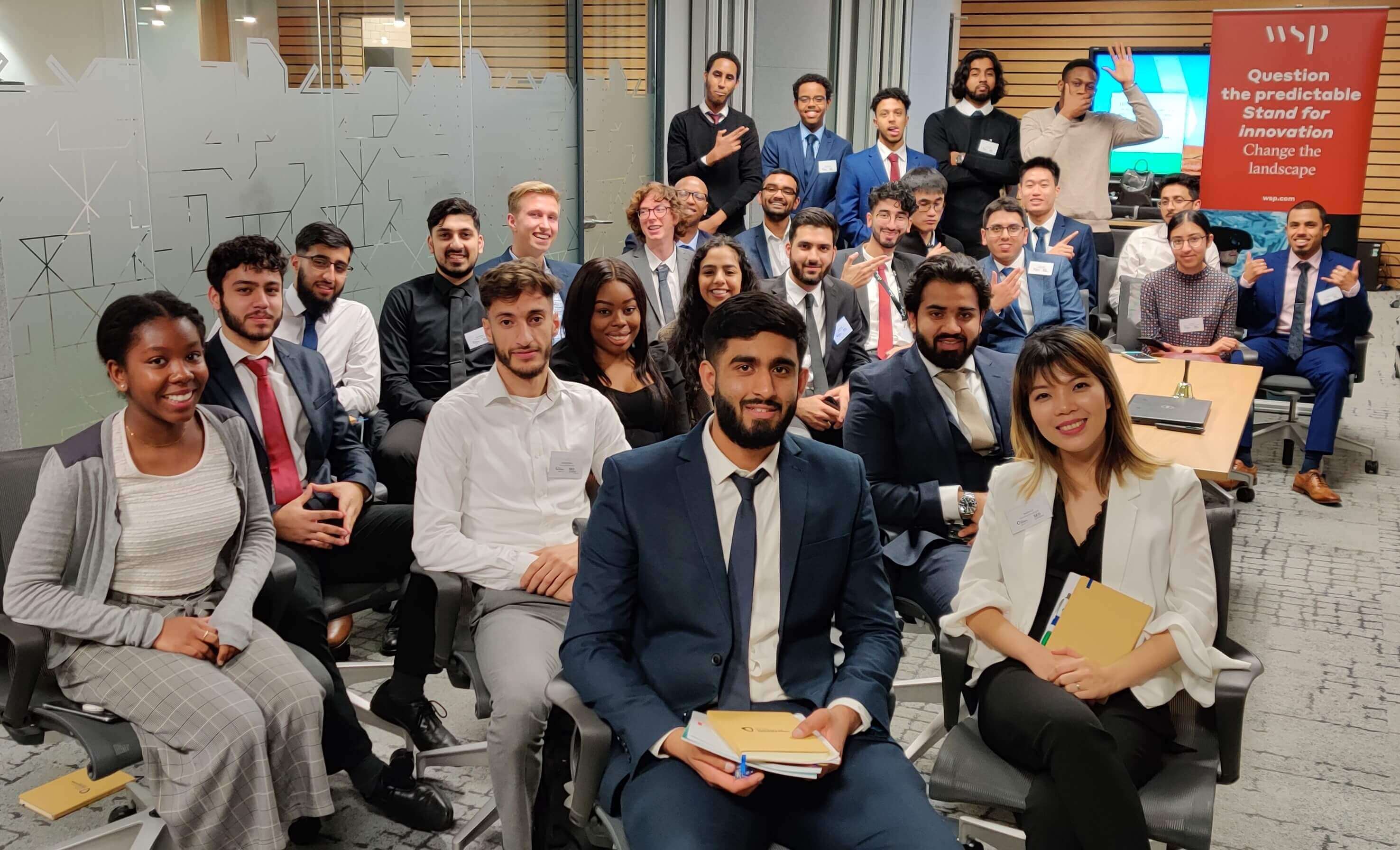
Students at a Graduate Engineering Engagement Programme event
Early in 2025, we celebrated the graduation of our very first cohort - 48 engineering and HR professionals across all levels from 12 companies including Hitachi Rail, Mott MacDonald, Rolls-Royce, The Manufacturing Technology Centre, and Zurich Engineering.
This marks a significant milestone in our efforts to create a truly inclusive UK engineering workforce. The three-year pilot programme aims to develop a scalable, practical and evidence- based model for building inclusive leadership mindsets in
engineering industry, which we can scale to upskill engineering leaders at all levels and support them to create a more inclusive engineering culture and more impactful engineering products, services and outcomes for society.
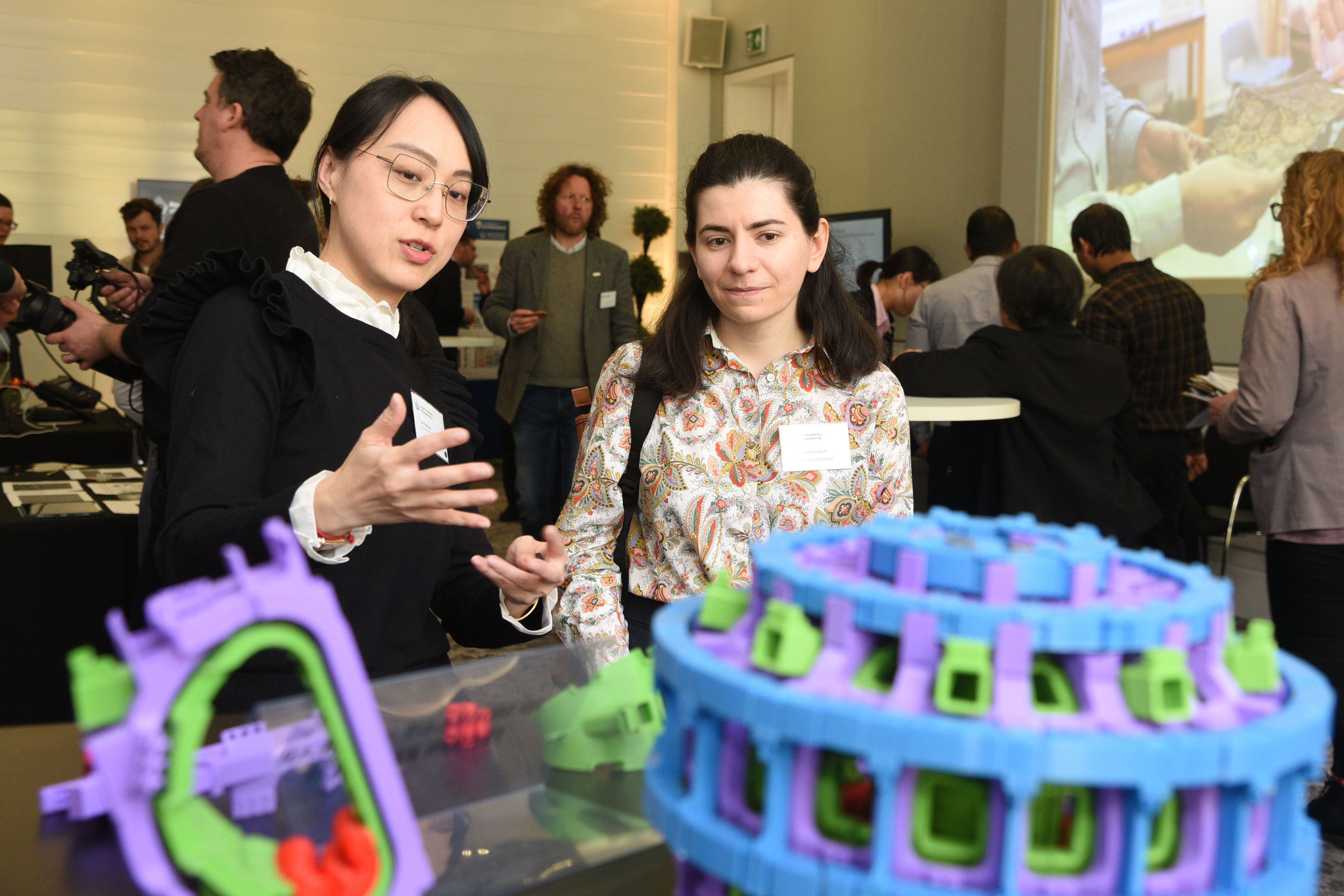
An exhibitor explains their research project at the 2024 Research Forum.
This year, with Technopolis, we carried out an evaluation of three of our well-established programmes – Research Fellowships, Research Chairs/Senior Research Fellowships, and Chairs in Emerging Technologies (CiET) – to monitor our progress. The findings showed that all of the programmes have contributed to their four key impact areas:
- research capability,
- career progression and leadership,
- innovation in engineering businesses,
- social and policy impact.
A highlight from the evaluation is the Academy’s ability to link engineering research with industry needs, as shown by high levels of collaboration with industry. This is evident in published articles, significant levels of follow-on funding gained from industry, and substantial economic value created by spinouts that have emerged from the research. Feedback from stakeholders showed that:
- 75% of awardees surveyed reported that the research award contributed to their career progression ‘to a great extent’.
- 97% of awardees agreed that their award has enhanced their ability to collaborate with industry and research users
- Industry partners said that Academy research programmes have led to the development of new products
Successes from supported researchers in 2025
Professor Timothy Denison FREng (Chair in Emerging Technologies) closing a $100 million Series A financing for his work with Amber Therapeutics on breakthrough neuromodulation therapy for mixed urinary incontinence in women.
Dr Andrew Lamb, an alumnus of the UK Intelligence Community Postdoctoral Research Fellowship, was also awarded a £2.4 million Small Business Research Initiative contract through his spinout company Delta g to develop the next generation of gravity gradient sensors and support the strategic growth of the UK as a quantum authority.
Innovation
Innovative industries and engineering enterprise have the power to improve productivity, public health, sustainability, safety and security. Over the past five years, we have focused on supporting engineering innovators to thrive and develop commercially scalable solutions, while encouraging increased and closer links between industry and academia – from supporting entrepreneurs directly and investing in research to working towards an evidence-based and supportive policy environment.
Green Future Fellowships
After receiving a £150 million endowment-style fund from government in early 2024, we launched Green Future Fellowships, the largest, most adventurous call for applications we have ever made. The programme will support engineers, scientists, researchers and innovators to accelerate their critical technologies into scalable, commercially viable products that will have a significant and lasting impact on global climate resilience. The programme received over 800 expressions of interest – our highest number of applications to a programme by a large margin.
MacRobert Award presented to Google DeepMind for GraphCast.
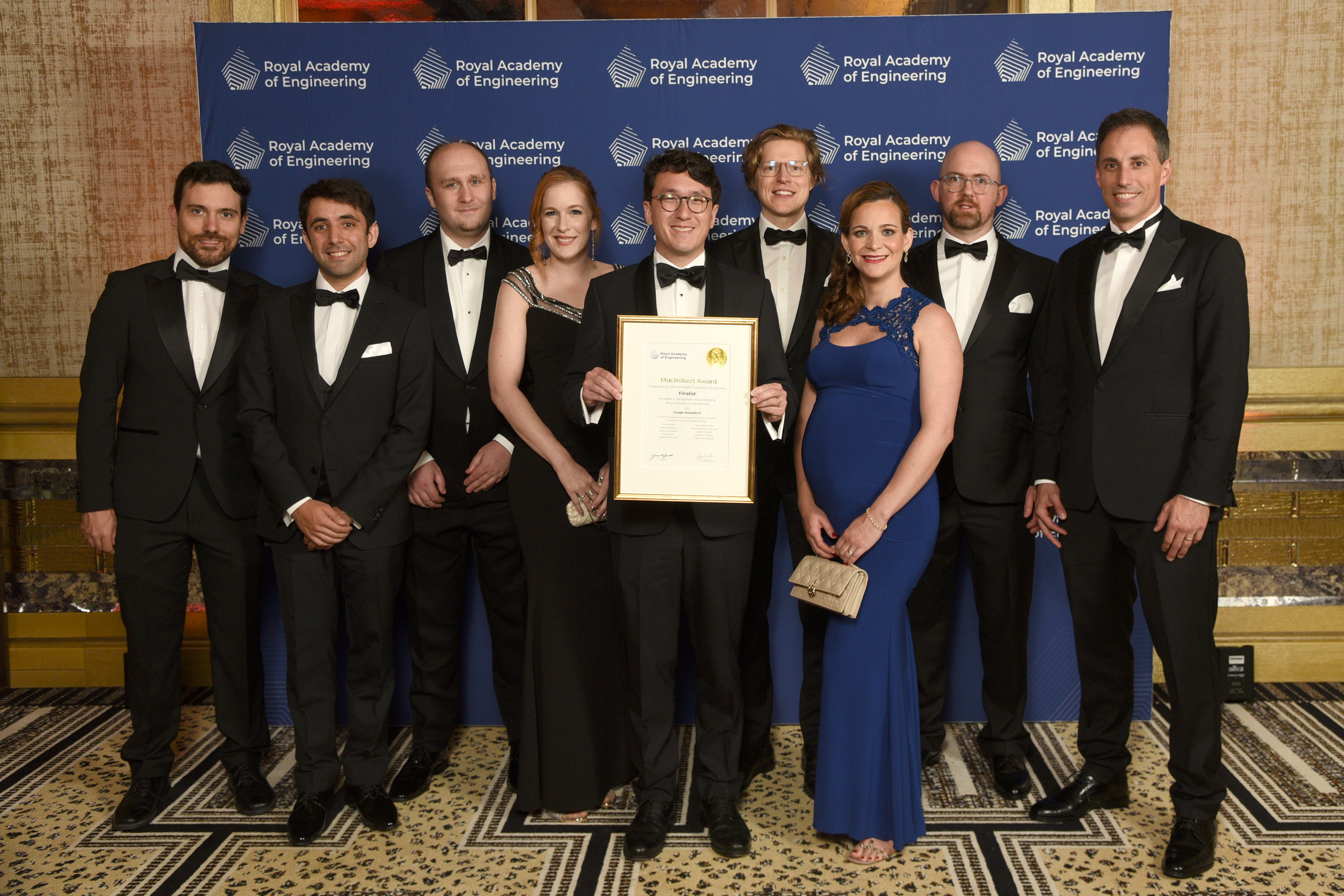
The Google DeepMind team behind GraphCast with their MacRobert Award certificate at the Awards Dinner.
At our Awards Dinner, the 2024 MacRobert Award was presented to Google DeepMind for GraphCast. Its AI-powered technology uses cutting edge machine-learning algorithms and vast data sets to provide highly accurate and more timely weather predictions that, among other advantages, could help mitigate the impact of severe weather events and, ultimately, save lives.The announcement received coverage in several outlets, including on Radio 4 and in the Telegraph and the New York Times. It was also the subject of a MacRobert Award special Innovation Incoming event in October, Weather Warnings from AI – a panel discussion hosted by BBC weather forecaster Tomasz Schafernaker that featured insights from Dr Peter Battaglia, who headed up the GraphCast team; Professor Penelope Endersby CBE FREng, CEO of the Met Office; Sir Richard Friend FREng, Chair of the MacRobert Committee; and catastrophe risk modelling expert Dr Joshua Macabuag FREng
Transforming Systems through Partnership
In February, we kicked off celebrations for the 10th anniversary of Engineering X’s Transforming Systems through Partnership (TSP) programme, which catalyses and supports industry– academia partnerships between the UK and partner countries to address the UN Sustainable Development Goals (SDGs).
The celebrations began with a three-day event in London, where we were joined by 40 TSP awardees from eight countries. During the event the awardees reflected on the achievements over the last 10 years, built their networks, explored the UK ecosystem with a visit to the Maxwell Centre at the University of Cambridge, and helped plan the programme’s future.
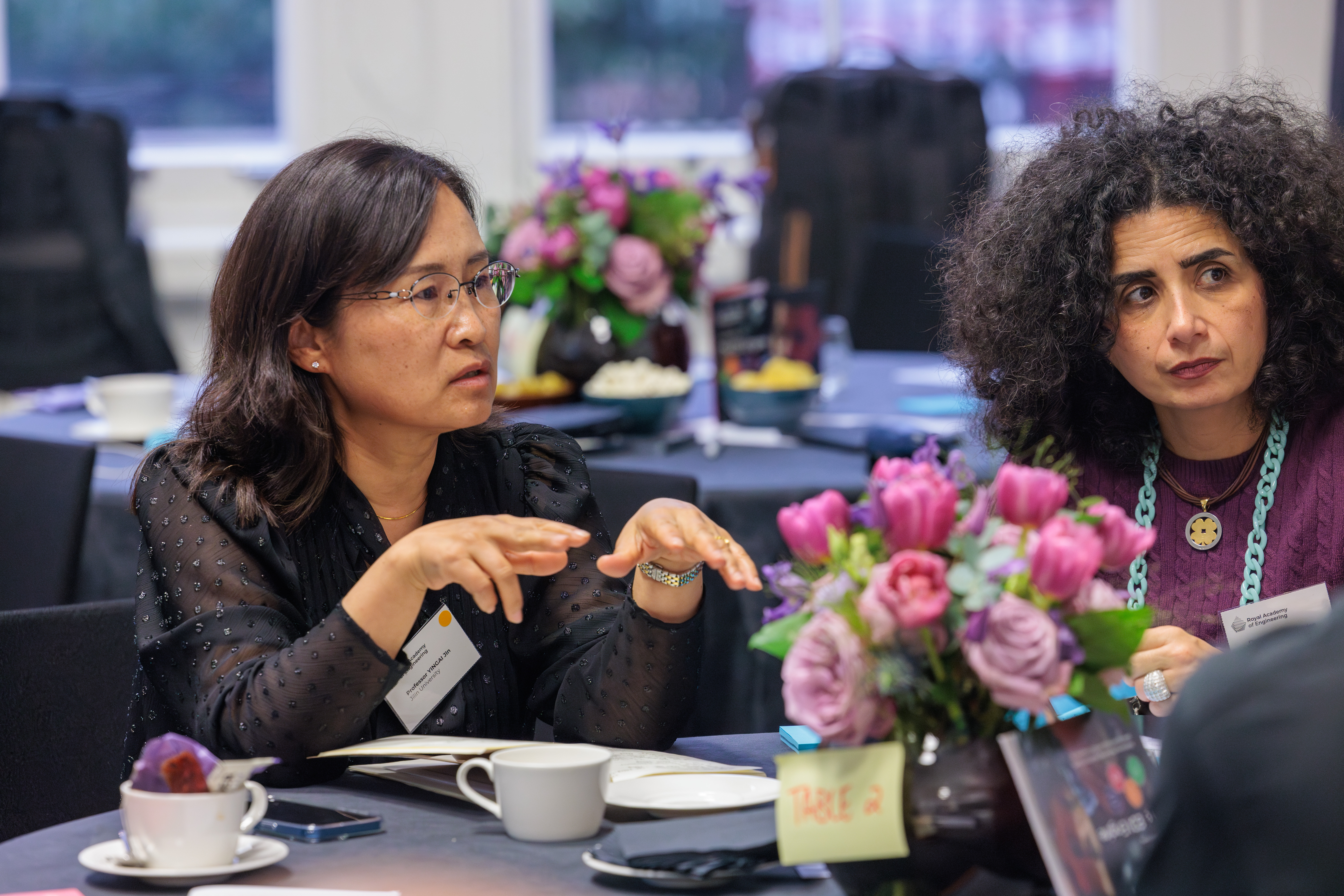
Attendees at the TSP 10-year celebration take part in a workshop.
Over the 10 years, 82% of awardees said that TSP was a very good or excellent use of their time, noting that it has helped them develop new skills and access new knowledge, and opened up opportunities to build professional networks and apply tech solutions in the real world. On a wider scale, organisations involved in the programme have built new
partnerships, accessed new funding sources, and developed new technology, patents, prototypes and proof of concepts.
In Colombia, three TSP projects resulted in a peer-to-peer energy trading pilot, giving local communities access to renewable energy for the first time and creating cost savings. In April 2023, the President of Colombia posted an article about the project to his 7.1 million followers on X. In Thailand, a project explored how to prevent hazardous waste being released when dismantling and recycling offshore structures, leading to the drafting of Thailand’s first-ever decommissioning law and enhanced waste management regulations in the country.
Regional Support
Regional support
In May 2024, we launched Enterprise Hub Scotland.
Based in Glasgow and with support from Glasgow City Council,
Glasgow City Innovation District, National Manufacturing
Institute Scotland and Scottish Enterprise, the Hub is
addressing the current opportunities and challenges facing
Scotland’s innovation ecosystem. Through collaboration with
other organisations, it is supporting engineers and innovators
to develop their commercial skills, offering mentoring and
profiling deep tech talent within Scotland.
In March 2025,this was followed by Enterprise Hub Newcastle, which – along
with an upcoming Hub in Liverpool – will support the work
of the Regional Talent Engines programme across the north
of England to support innovation and grow businesses in the
local areas. These actions continue to build on the findings of
our Engineering, Economy and Place analysis from 2023, which
found that the UK’s engineering economy contributes nearly a
third of total economic output and more than a quarter of UK
jobs, but action is needed to address geographic inequality.
Global support
This year saw the Academy hold its first Frontiers symposium in Australia. It brought together over 60 researchers and engineers from 19 countries in Perth, in partnership with the Australian Academy of Technological Sciences and Engineering.
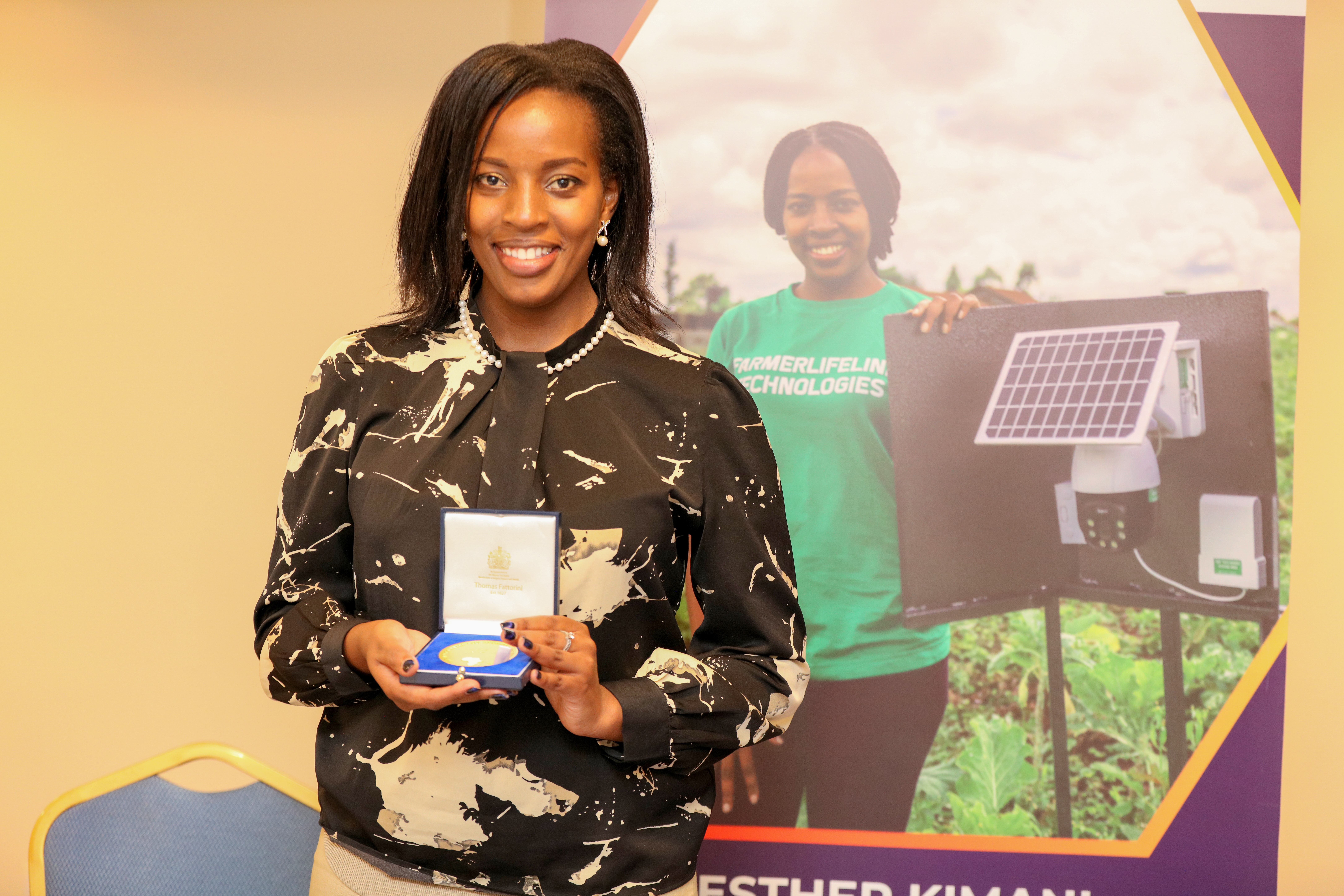
Esther Kimani from Kenya, won the 2024 Africa prize for her early crop pest and disease detection device that reduces crop losses by up to 30% and increases yield by as much as 40%.
The Leaders in Innovation Fellowships (LIF) programme also successfully welcomed 80 innovators to the UK over the summer, drawing a close to seven months of training, mentoring and networking designed to support those commercialising a novel technology (LIF Global), or scaling and internationalising a customer-validated product (Advance).
Since then, the innovators from the LIF Global cohort have:
- Raised $10.5 million in further funding;
- Created 10 functional prototypes
- Created two new companies and 18 skilled jobs.
The Advance cohort have:
- Created five new companies and 106 skilled jobs;
- Raised over $3.8 million in further funding;
- Established 11 partnerships between innovators on the programme, plus 20 partnerships with UK organisations.
Presidents Special Medal awarded to His Majesty’s Government Communications Centre (HMGCC)
HMGCC received this award for its exceptional and long-standing contributions to engineering
innovation and national security over the last 80 years. HMGCC works on the latest technological challenges, from cybersecurity and AI to creating tech to help with intelligence gathering or secure communications, in often dangerous or hostile locations. The President’s Special Awards celebrate only exceptional achievements representing excellence in engineering, having previously been presented to innovators responding to the COVID-19 pandemic.
Early in 2025 we officially launched our Science and Technology Venture Capital (VC) Fellowship, delivered in partnership with Imperial College London and funded by the Department for Science, Innovation and Technology. The Fellowship is designed to enhance investor capability in identifying and deploying capital into high-potential, scalable life science and deep-tech ventures. A launch event brought together representatives from government, industry, and the VC and investment community to outline the vision and celebrate the start of this pioneering new programme, with a keynote speech by Science Minister Lord Vallance of Balham HonFREng FRS FMedSci. This first cohort features 22 outstanding fellows, selected from a strong pool of applicants. The programme provides knowledge and leadership development, experiential learning, mentoring, and networking to help develop a strong talent pipeline in UK science and technology VC investment – and has so far received positive feedback.
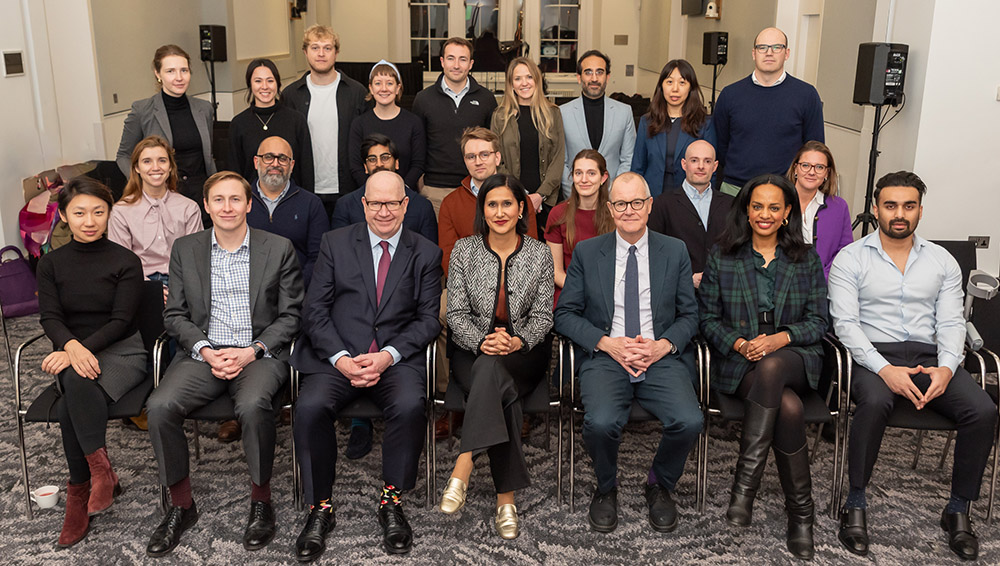
The first cohort of the Science and Technology Venture Capital Fellowship, with Professor Peter Todd (front row, third from left), Dr Hayaatun Sillem CBE (front row, centre), and Lord Vallance (front row, third from right
State of the UK deep tech report
We also launched our annual report on the state of UK deep tech, which highlights the need for more deep-tech expertise in VC. The report is a comprehensive overview of the deep-tech sector and this year flagged a slowdown in the UK’s overall VC activity in deep tech since a peak in 2021. It also highlighted, however, that key sectors such as healthcare and AI continue to drive significant deals: each sector secured more than £1 billion in investment in the first half of 2024.
Other findings include that deep tech consistently attracts over £5 billion in annual VC, with a smaller group of companies now receiving bigger cheques as investors become more selective, and global interest in the UK’s deep-tech sector is increasing, with foreign firms participating in over 300 deals annually since 2021. However, the report also highlighted that investors need specialised training, as the UK faces a shortage of investors with relevant expertise, which negatively impacts domestic investment.
Upon launch, The Times published an extensive interview with President Sir John Lazar, covering the report and the launch of the new fellowships. Both news items were also covered in other engineering trade and business news outlets.
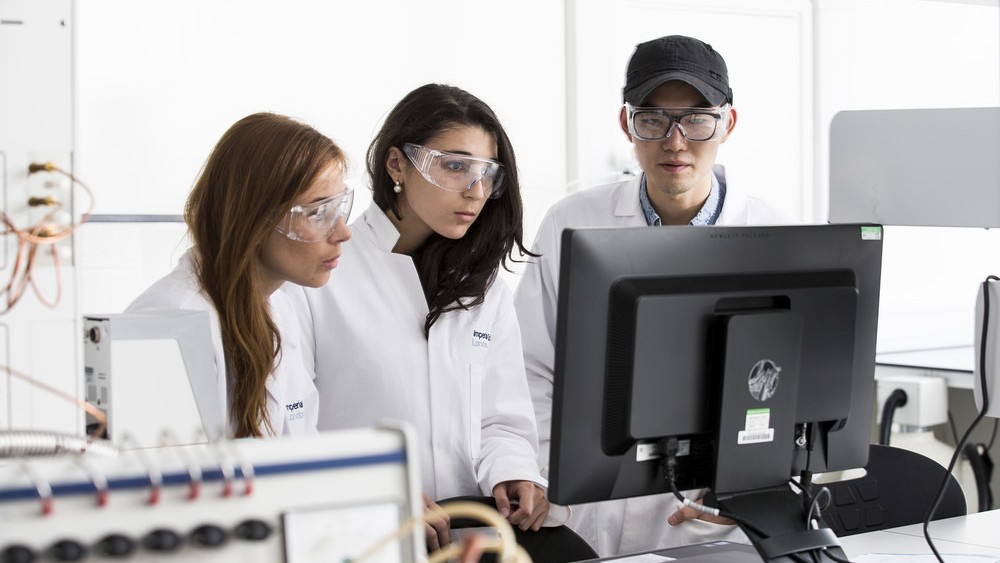
Policy and engagement
To help drive prosperity and increase progress towards a sustainable, inclusive future, engineering expertise should be at the heart of decision-making – across government, within communities and internationally.
Our actions over the past five years have ensured that engineering expertise is easily accessible to policymakers – through the National Engineering Policy Centre (NEPC) – and that engineers engage with wider society to increase awareness of engineering’s relevance and impact, building excitement to inspire young people to join the profession. Our work with international networks and collaborations is also aiding understanding of how engineers can contribute to solving complex global challenges.
Our policy activities this year have been closely aligned to key events and important issues in wider society.
This was particularly evident in the run up to July’s General Election, when we worked with our partners in the NEPC to put engineering issues on the new government’s radar. This included our policy priorities for the next UK Parliament, Engineering a resilient and prosperous future, which were underpinned by a call to take a systems approach across government policy. Following the launch of this manifesto, we presented these priorities at a parliamentary briefing that included speeches from Lord Mair CBE FREng FRS, Baroness Brown of Cambridge DBE FREng FRS FMedSci and Energy Minister Michael Shanks.
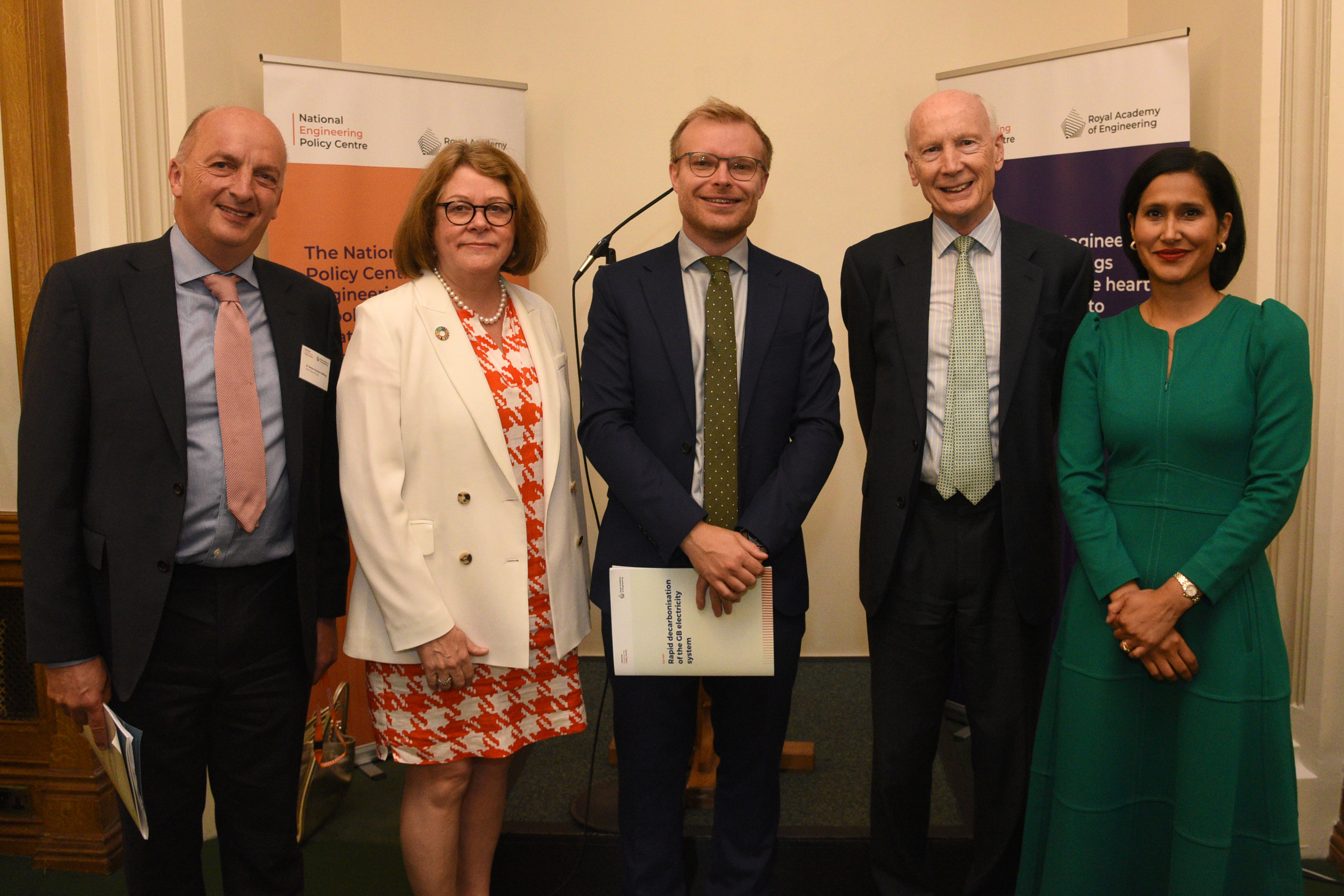
(L–R) Simon Harrison FREng ,Baroness Brown, Michael Shanks, Lord Mair, and Academy CEO Dr Hayaatun Sillem at the breakfast briefing at Parliament
Key Policy reports for 2025
Testing the waters: priorities for mitigating health risks from wastewater pollution
Published in May, Chief Medical Officer for England, Professor Sir Chris Whitty KCB HonFREng FRS, spoke at our press conference to launch the report, while working group chair Professor David Butler FREng and contributor Professor Barbara Evans were both interviewed on BBC Radio, as well as by many other outlets including broadcast media. This report is the first to assess how to reduce the public health risk for recreational users of open water contaminated with human faecal matter and received widespread national news coverage. Since publication, it continues to influence the research agenda in Defra and the Department of Health and Social Care. It also informed the framing of the Independent Water Commission, where we continue to support policy development, as well as our input to reviews of Bathing Waters Regulation by the Office for Environmental Protection and Defra.
Engineering a resilient and prosperous future
One key topic at the event was our recently released report outlining the radical approach the government must take to decarbonise the UK’s electricity system and provide clean power by 2030.
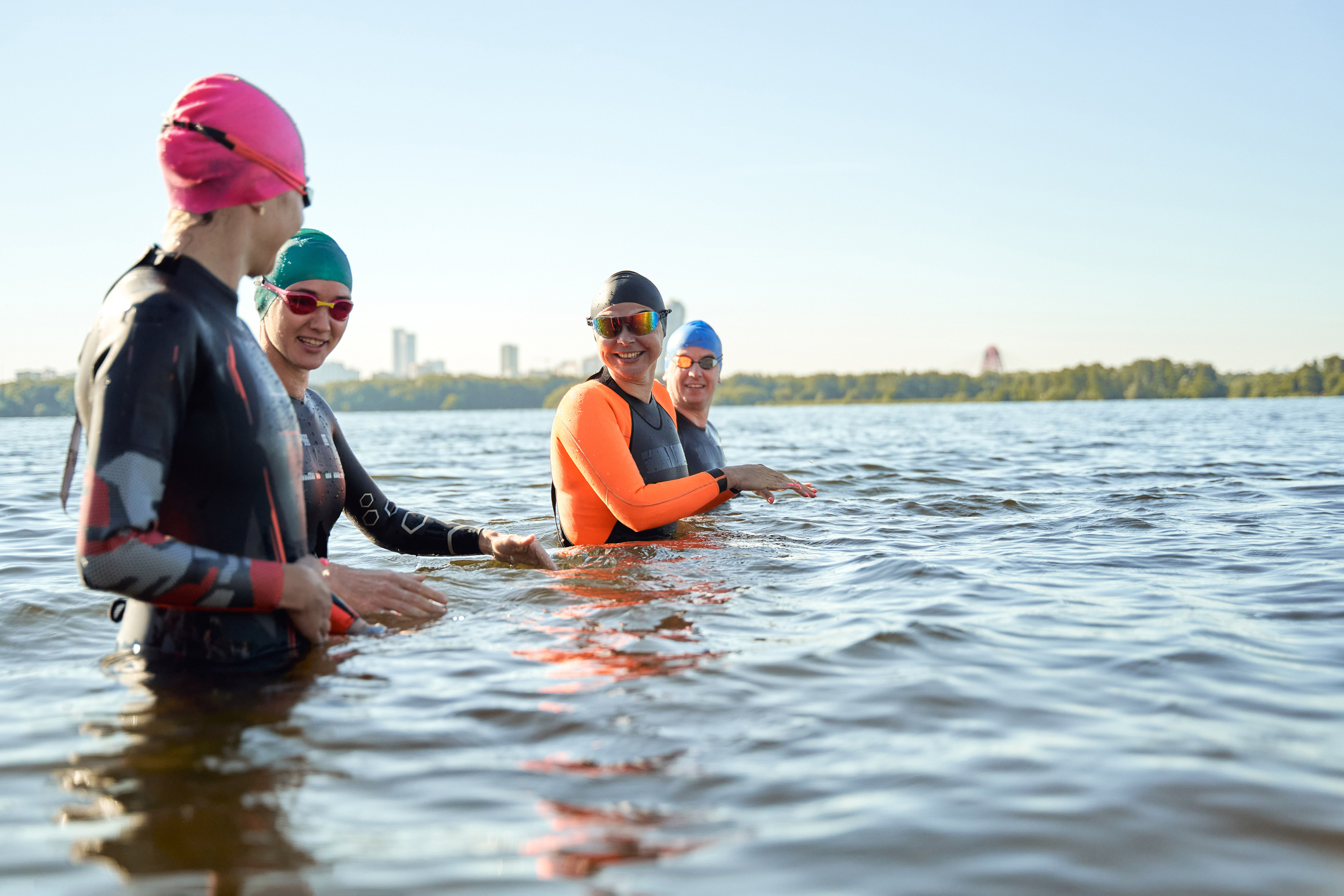
Compiled by an independent working group led by the Academy, the report drew insights from NEPC partners, including the Institution of Engineering and Technology and Institution of Civil Engineers, who also hosted a roundtable. We also briefed key individuals at the Department for Energy Security and Net Zero on the work, including Chris Stark, Head of Mission Control, Jeremy Pocklington, Permanent Secretary, and Professor Paul Monks, Chief Scientific Adviser, as well as leading figures at the National Energy System Operator (NESO) and Ofgem.
As well as gaining significant national media coverage, we have shared the key messages from the report – including the importance of rapid digitalisation and data sharing to enable a future decarbonised system – in a response to a consultation by Ofgem on its proposals for Digital Sharing Infrastructure. And it has formed the basis of a briefing on the issues that will need to be dealt with in the Planning and Infrastructure Bill. We have also delivered two workshops: one directly for the Clean Power Unit to provide engineering insights and perspective on how to move into delivery mode following publication of the Clean Power Action Plan; and one in collaboration with NESO to provide cross-sector input into its Sector Digitalisation Plan.
Critical materials: demand-side resource efficiency measures
for sustainability and resilience
In October, our report on critical materials advised the government to develop an integrated materials strategy to reduce demand for, reuse and recycle critical materials essential for the UK’s current Net Zero Strategy. One key policy recommendation from the report was recommitting to banning single use vapes, which the government confirmed
plans for later that month. After the report’s launch at a Science Media Centre briefing to journalists, the Academy hosted a panel event chaired by Professor Mark Miodownik MBE FREng to further promote the report and its key findings to policymakers, industry stakeholders, academics, and regulators. It received coverage from outlets including Top Gear, The Times, and The Chemical Engineer.
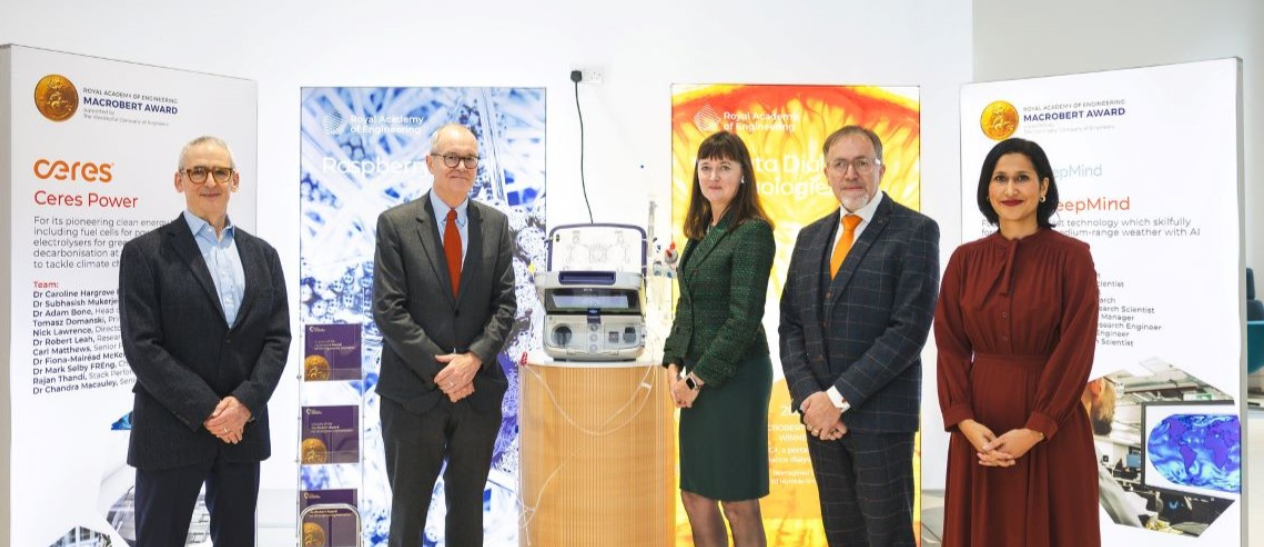
(L–R) Academy President Sir John Lazar; Science Minister Lord Vallance; Chair of the MacRobert Award Judges Dr Alison Vincent CBE FREng; 2022 MacRobert Award winner Professor Clive Buckberry MBE FREng of Quanta Dialysis; and Dr Hayaatun Sillem visit a special MacRobert Award exhibition at DSIT.
Academy representatives also met with numerous policy teams across Whitehall to discuss key findings and policy recommendations from the report, as well as arm’s length bodies such as the National Infrastructure Commission and the Infrastructure and Projects Authority. This report is part of an ongoing body of work on materials and net zero. A further output that has been developed following this report is a commissioned analysis on the amount of neodymium permanent magnets available in existing and upcoming UK offshore wind stocks, and their potential for circular use of the critical materials within.
Early in 2025, we published a report outlining the foundations for sustainable AI, as part of the NEPC’s Engineering Responsible AI series. Delivered in partnership with the Institution for Engineering and Technology (IET) and BCS, the Chartered Institute for IT, it describes the environmental impacts of AI systems and services. The report was timed to coincide with the AI Action Summit,which took place in Paris on 1 February and was a major international event in the AI calendar. We held a discussion at the AI Fringe in London on how technology, engineering, data, and multidisciplinary conversations can help build more sustainable AI, with Dame Dawn Childs DBE FREng, Professor Marina Jirotka and Loïc Lannelongue. The report also responded to the UK government’s AI Opportunities Action Plan, noting that as government looks to accelerate AI adoption in the UK,it is critical we embed the principle of sustainability in how we design, build and use AI.
Engagement with policymakers and the media
There has been strong engagement with the report since publication. The Academy has been corresponding with policymakers in the UK, Scottish and Welsh governments, offering support to DSIT on its AI Growth Zones and participating in the Government Digital Sustainability Alliance working group.
The Academy has also joined the Coalition for Sustainable AI.The report received extensive media coverage, with mentions from the BBC, the Guardian, and ITV in the UK, as well as BBC Arabia and CBS in the US.
Futures and Dialogues programme
Our Engineering Responsible AI work is supported by our Futures and Dialogues programme, through which we have
hosted ‘People’s AI Stewardship Summits’ in partnership with the Regional Enterprise Hubs.
Following the first summit in Belfast in early 2025, we have hosted a further two in Glasgow and Liverpool. The summits bring together innovators,researchers, entrepreneurs and policymakers with local community members to explore hopes, fears and expectations for safe and responsible AI. The events have prompted wide ranging discussions about AI’s role in society and how benefits can be more equitably shared in the places and communities where innovations arise. With a further two planned in Swansea and London, the summits will contribute a valuable mix of perspectives to the growing ecosystem of public deliberations on AI taking place both in the UK and internationally.
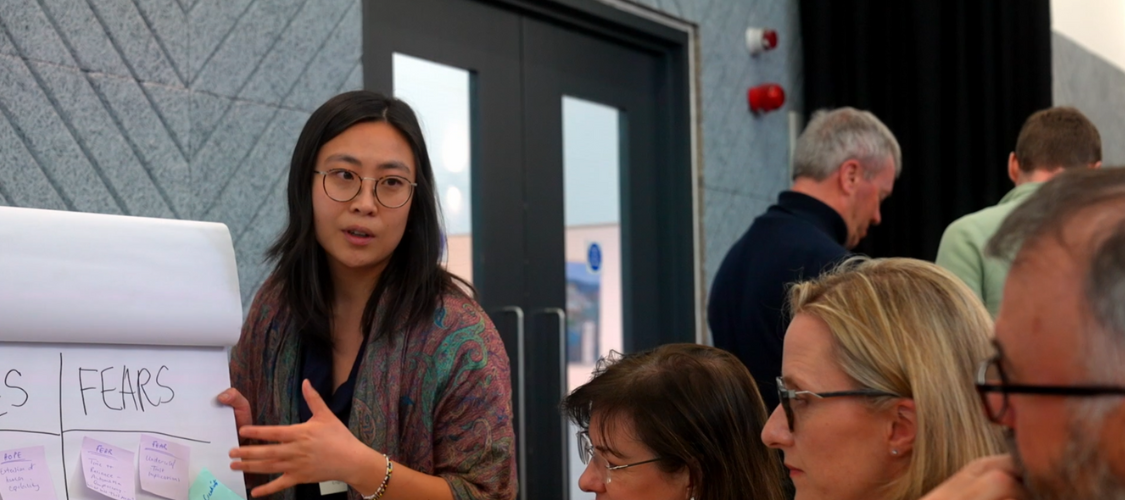
Attendees at the Belfast AI summit
National Engineering Day
With the theme of ‘Engineering role models’, 2024’s National Engineering Day aimed to inspire a new generation to see themselves reflected in engineering. To do this, we unveiled a striking new statue at Prince Philip House and a digital artwork of five inspiring engineers selected by the public. The statue of Macclesfield-born manufacturing engineer Alice Kan, who played a pivotal role in the manufacture of the COVID-19 vaccine and is now working on vaccines for Ebola, was designed in a modern and vibrant style by visual artist and designer Kelly Anna. To further inspire future engineers around the country, the statue has since been displayed at Edinburgh Science Festival and will tour other locations. The campaign came at a pivotal moment, as research commissioned for National Engineering Day showed the crucial role of representation in inspiring the next generation, with 80% of respondents aged 12 to 15 naming the importance of having a role model to look up to for personal and career goals.
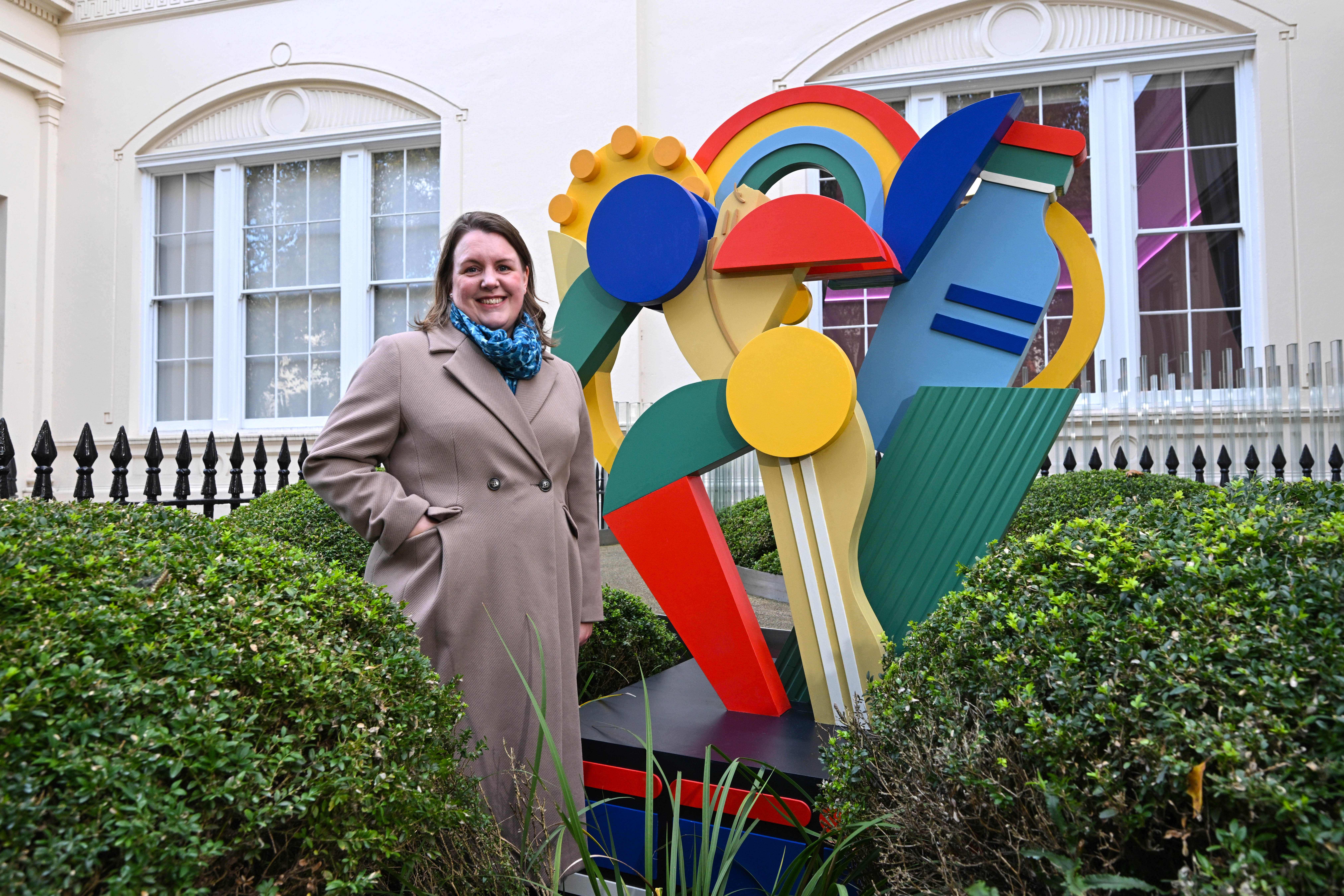
Manufacturing engineer Alice Kan, with the vibrant wooden statue artist Kelly Anna designed to honour her technical contributions, tenacity, resilience and commitment to making the world a more inclusive and better place for future generations.
Media highlights on the day included Sky News’ interview with This is Engineering protagonist and founder of sustainable materials company MarinaTex, Lucy Hughes, who spoke about the engineering skills gap, as well as pieces in The Engineer and The Chemical Engineer. A wave of social media activity saw #NationalEngineeringDay trending on X with over 32 million impressions on 13 November.
On LinkedIn and Instagram, numerous engineers, influencers and supporters spread the word, including Sir Lewis Hamilton HonFREng, Sadiq Khan, Ferrari UK and DSIT. Several MPs and Peers visited Prince Philip House to see the statue, including Chi Onwurah MP who also posted a video message on X. Lord Vallance also celebrated his engineering role models in a video message.
Innovation Late

The day was brought to a close with the third iteration of our popular Innovation Late event, an evening of engineering-themed exhibits and talks aimed at raising the profile of engineering among adults without engineering backgrounds. The event welcomed more than 200 attendees, with 73% having never been to an Academy event before.
Innovation Late was previously held in Scotland in April 2024 to coincide with Edinburgh Science Festival – as well as celebrate the legacy of Lady MacRobert and the 55th anniversary of the MacRobert Award. Photographer Ted Humble-Smith showcased a brand-new set of images at the event, commissioned to celebrate the Award’s anniversary. Professor Gordon Masterton OBE DL FREng, Trustee of the MacRobert Trust and MacRobert Award judge, and CEO Dr Hayaatun Sillem CBE were interviewed by journalist Matthew Parris for BBC Radio 4’s Great Lives programme, exploring the remarkable life of Lady MacRobert, the inspiration behind the prize. The programme inspired further coverage in The Times and Daily Mail.
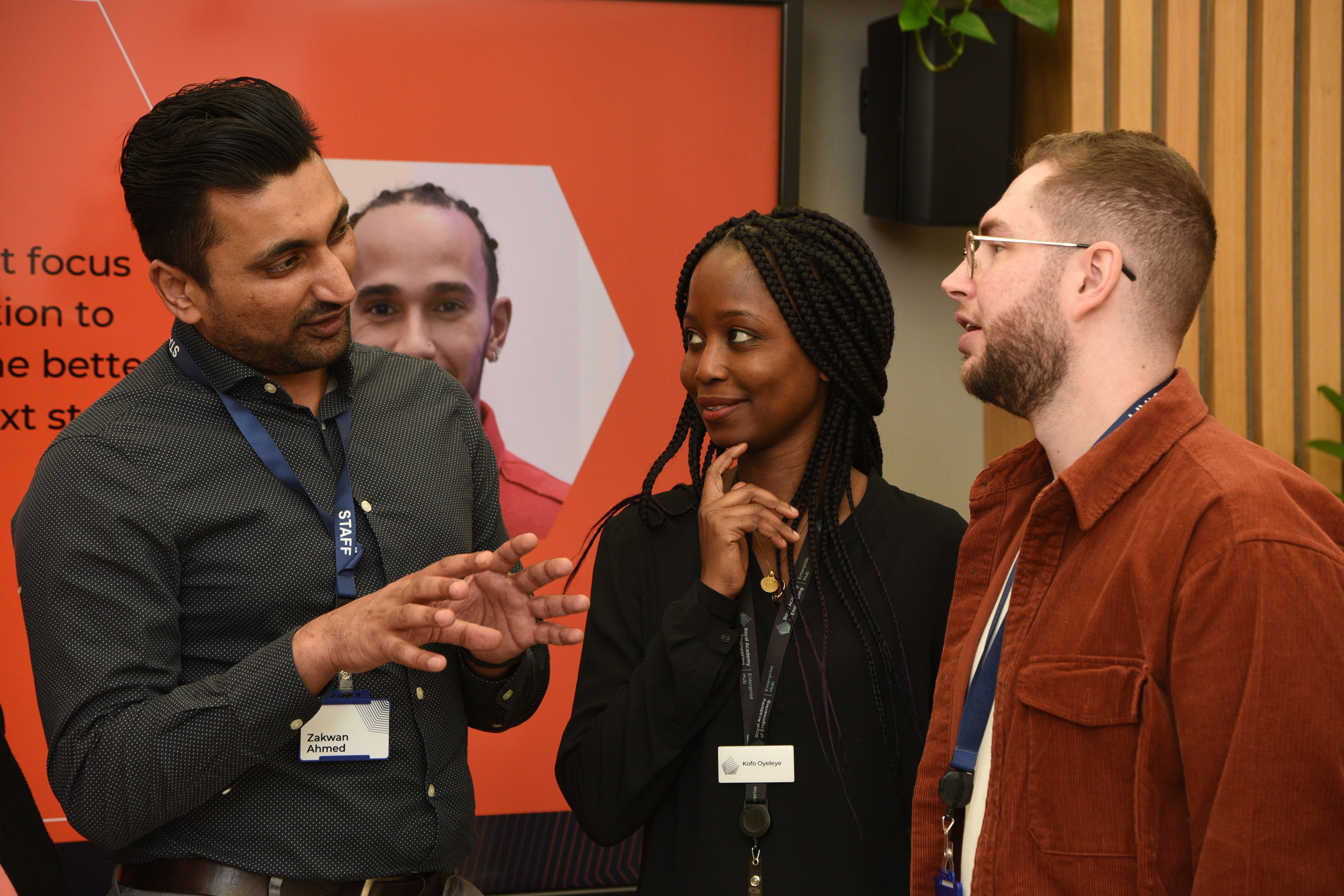
People and operations
As a charity, National Academy and Fellowship, we aim to deliver public benefit from engineering excellence and technology innovation.
To achieve the ambitions in our strategy over the past five years, as well as creating the best experience for everyone connected to the Academy, we have significantly improved our operational capacity and increased our team of staff, with a renewed focus on their development and wellbeing.
Our new President and Fellows
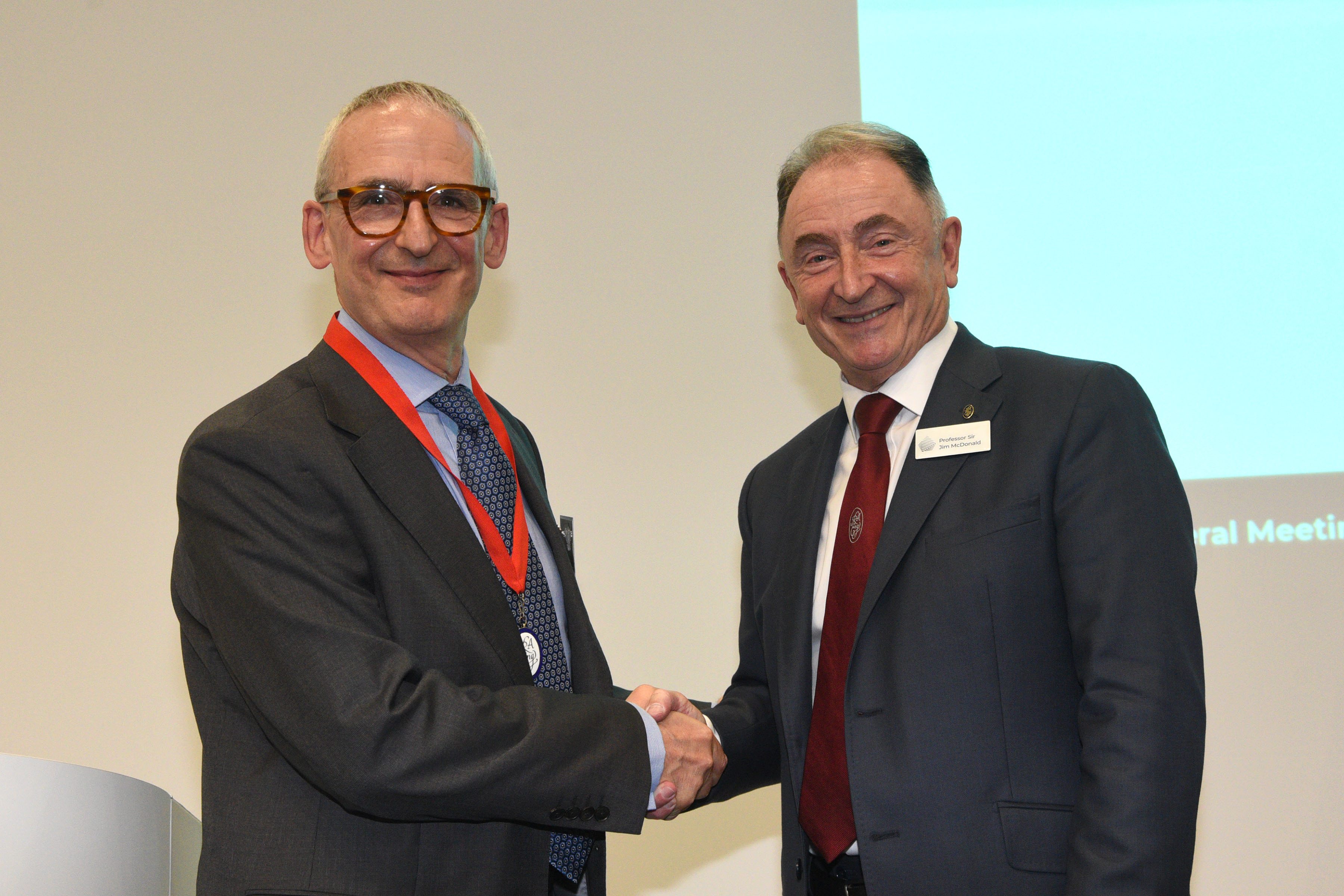
Outgoing President Professor Sir Jim McDonald GBE FREng FRSE (right) hands over to incoming President Sir John Lazar CBE FREng at the Academy’s AGM in September 2024.
At our AGM in September, alongside electing 71 new Fellows under our Fellowship Fit for the Fellowship initiative, we also elected a new President – Sir John Lazar CBE FREng. Having been elected to the Academy in 2011, Sir John has been actively involved in much of its work, including as chair of the Enterprise Committee, member of the Education and Skills Committee, and judge and mentor for the Africa Prize for Engineering Innovation, and is the first tech entrepreneur to lead a UK National Academy. The AGM was also a send off for outgoing Academy President, Professor Sir Jim McDonald GBE FREng FRSE, who steered the Academy through complex challenges, including the COVID-19 pandemic, the increasing impacts of climate change and the rapid advances in AI. Sir Jim was profiled
in the Observer in September, reflecting on the progress made by the Academy over his five-year term in office.
Diversity across our Fellowship and Trustee Board
Our Fellowship represents an unrivalled community of leading businesspeople, entrepreneurs, innovators, and academics from every part of engineering and technology. Over the past year, Fellows have volunteered an estimated 25,000 hours to support the Academy in driving public benefit from engineering excellence and technology innovation. Our Fellows elected in 2024 reflect the Academy’s ongoing Fellowship Fit for the Future initiative, by electing our most diverse cohort to date of 68% from underrepresented groups, surpassing its aim of 50%. The initiative is driving more nominations of outstanding engineers from underrepresented groups ahead of our 50th anniversary in 2026. It sees the Academy striving for increased representation from women, disabled and LGBTQ+ engineers, those from ethnic minority backgrounds, non-traditional education pathways and emerging industries, and those who have achieved excellence at an early career stage.
The Academy’s Trustee Board is also committed to forming a Board that is fit for the future, defined as a body that represents the full breadth and diversity of engineering excellence, as well as the skills and experiences
needed to provide effective leadership for the Academy. To help achieve this, one of the main responsibilities of the Academy’s Nominations Committee is to actively seek and encourage people from different groups to stand for
election. The Board is guided by the values of the Academy to create a culture in which everyone can thrive and diverse perspectives enrich its collective performance; in support of this commitment, the Trustee Board publishes its own diversity data (see report pdf pg 37)
New Trustees
The AGM also saw the election of four new Trustees to the Trustee Board, including Professor Nick Jennings CB FREng FRS as Vice President for Fellowship Engagement. A key focus of the Academy is boosting the engagement of all Fellows with the Academy’s work and delivering a wide range of Fellowship activities and events that are relevant and impactful. Ensuring opportunities are provided in all areas of the country is
increasingly important to us.
Regional events for Fellows
This year we held several regional events for Fellows. In June, Fellows gathered in Sedgefield to visit to NETPark with a tour of local engineering businesses Kromek and Wootzano, followed by an evening dinner at Hardwick Hall. In October and November, Fellows gathered for two regional events in the Midlands to consult on our new strategy and enjoy lectures and networking. At the East Midlands event, Fellows and Academy awardees joined a closed consultation session for the Academy’s new 2025 to 2030 strategy.
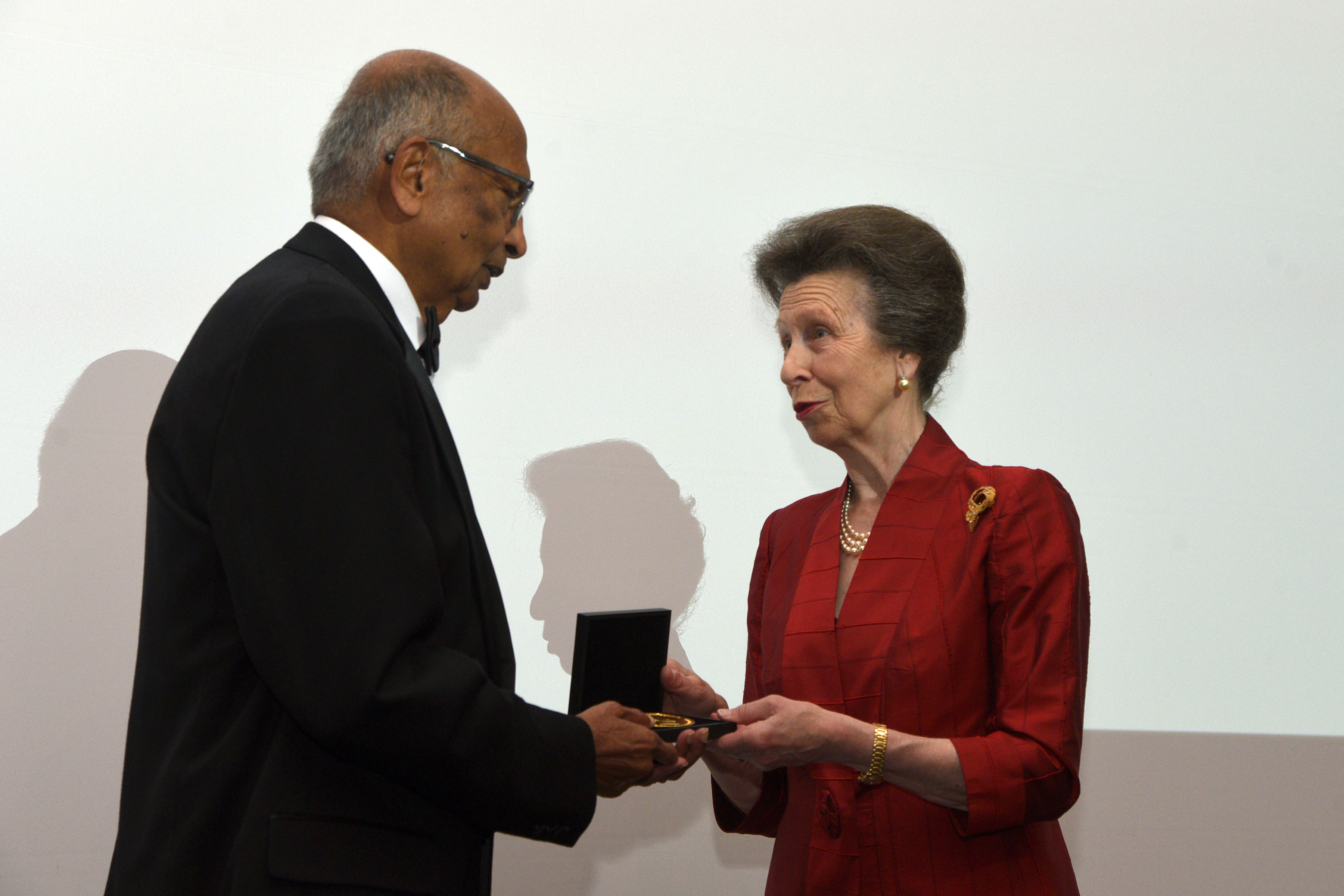
Our Royal Fellow, HRH The Princess Royal, presents the 2024 Prince Philip Medal to Dr Arogyaswami J Paulraj, the inventor of multipleinput, multiple-out technology, at the annual Prince Philip Dinner in June 2024.
This was followed by a public lecture from Professor Nick Jennings CB FREng FRS on the topic of AI-powered universities, then a reception and evening dinner at Leicester’s Belmont Hotel. One month later marked the first time that a Fellows’ regional event has been held in the West Midlands. After a strategy consultation, Fellows engaged in an enjoyable and informative site visit at the University of Birmingham, taking in the Makerspace, the Space Environment and Radio Engineering facility, and the National Buried Infrastructure Facility. This was followed by a public lecture on the challenges of net zero, by Professor John Loughhead CB OBE FREng. Finally, Fellows, awardees and academics gathered at the Edgbaston Park Hotel for an evening drinks reception and dinner.
Our Environmental Sustainability Action Group is an employee-led group that is working to minimise the impact of the Academy’s activities on the environment. Modelling good practice as an Academy is an important step in helping to achieve our goal of a sustainable and innovative economy. The group continues to ensure that the Academy improves its environmental performance through a carbon benchmarking exercise with Planet Mark, which offers certification based on leading international standards. We’ve been working with them to establish a carbon baseline over the past five years, with the most recent exercise looking at the financial year 2022 to 2023.
As previous years covered the pandemic and the gradual move out of lockdown, the most recent results saw a significant increase in our overall footprint compared to the previous year, owing to a large increase in international travel as we returned to something close to pre-pandemic levels of overseas trips. Given the year-on-year fluctuations due to the pandemic, it is hard for us to draw clear conclusions on annual change.
However, this continued data collection has been helping us to include more data into our measurements and, going forward, to get a better idea of our emissions trends. Once we have this understanding, we can start to implement changes with a view to reducing our carbon footprint.
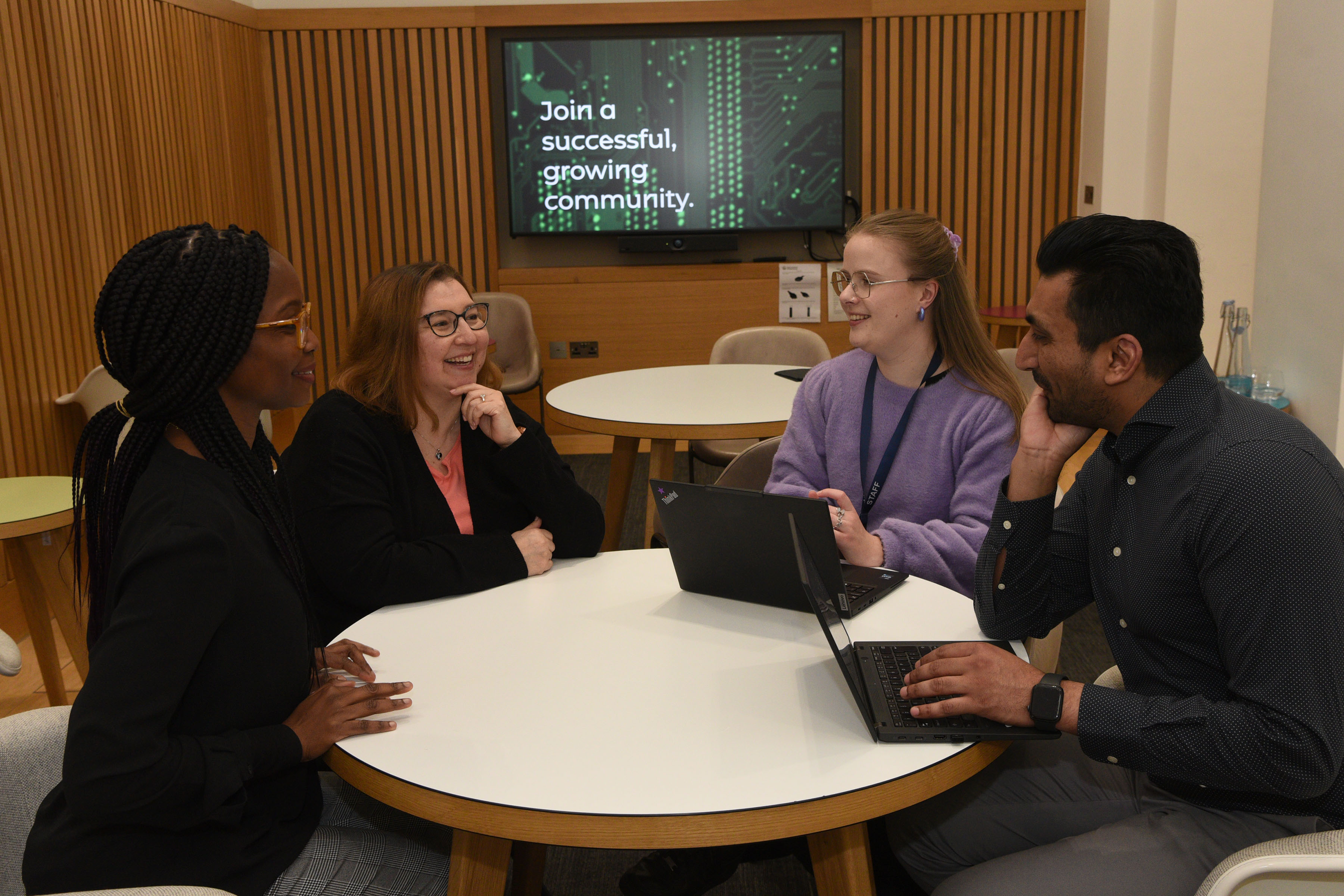
Employees across the Academy are progressing and monitoring actions to embed EDI in all of our activities as part of the EDI One Action Plan.
Equity, Diversity and Inclusion (EDI) One Action Plan
In 2024/25, key actions from our Equity, Diversity and Inclusion (EDI) One Action Plan started to take shape. Equity, diversity and inclusion is a critical thread that runs throughout all of the Academy’s work, and the EDI One Action Plan aim is to continuously upskill colleagues, embed EDI internally, share good practices in all our external activities to help progress D&I throughout engineering, and enable excellence in all of our activities. We have signed up to Business in the Community’s Race at Work Charter and are making progress against the actions and each of the commitments as defined by the charter. We voluntarily report and share gender pay gap analysis (see pdf report pg 41), as well as sharing data for the ethnicity pay gap as part of our commitment to the Race at Work Charter.
Website accessibility
We’ve also been making progress, working with the Shaw Trust, on improving our website’s accessibility. We are working towards technical standard Web Content Accessibility Guidelines (WCAG) 2, and implementing the fixes required to meet it following an external audit in 2024. A full website accessibility statement is now available on the site, which will again be submitted for external auditing and testing against the standard in the new financial year.
Future Plans
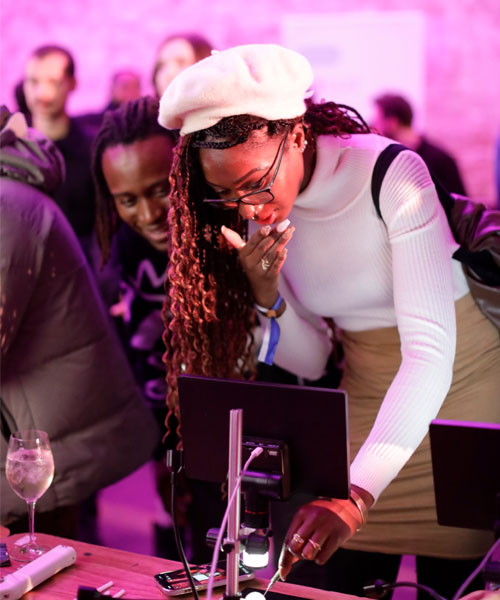
Attendees at Innovation Late on National Engineering Day in November could try out exhibits, including this one where they could test how they fare operating on an ‘eye’ compared to a robot
April 2025 marks the start of a new five year strategy period, to 2030 in which we will create and lead a community of outstanding experts and innovators to engineer better lives, with a focus on three goals: a sustainable and innovative economy, technology improving lives, and an engineering community fit for the future. In keeping with our values, much of our work towards these goals will be delivered through collaboration with key partners across the UK and around the world, and through our five flagship products:
- Enterprise Hub
- Research and Invention Fellowships
- Engineering X
- National Engineering Policy Centre
- Skills Centre
Our three goals for the next five years are:
- Sustainable and Innovative Economy
- Technology Improving Lives
- Engineering Community Fit for the Future
Details on the activities that we will be undertaking in 2025/2026 to fulfill our goals are outlined in the report pdf, pg 44- 47.






